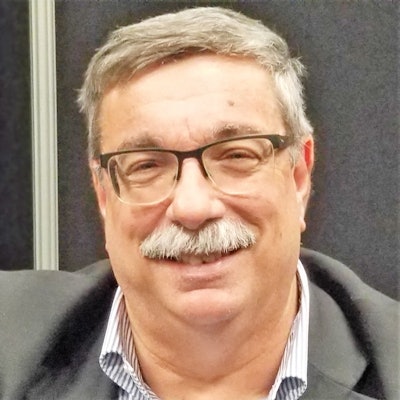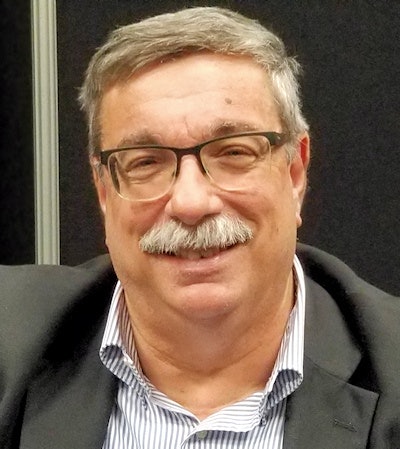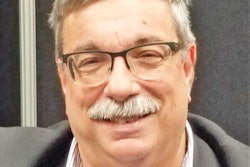
This is the first time in two years where everyone will be together again in Chicago. Although the RSNA put on the best virtual show possible last year, nothing beats the face-to-face encounters that attendees will get to enjoy again this year.
 The PACSman, Mike Cannavo.
The PACSman, Mike Cannavo.About 500 vendors will be exhibiting at RSNA 2021 -- down about a third from 2019's numbers -- but it's amazing that so many are showing up given the uncertainty still surrounding COVID-19. This also includes 70 first-time exhibitors.
Nearly 20,000 attendees are preregistered as well, down over half from 2019 but still good considering the circumstances
The following are a few tips to help you make the most of your time:
Artificial intelligence
Artificial intelligence (AI) is the hot area in radiology this year. There are over 200 vendors in the AI marketplace and over 100 that have U.S. Food and Drug Administration (FDA) 510(k) clearance. Does that mean all 100+ deserve a closer look, even if they all were at the show? Far from it.
When looking at AI you need to focus on just a few things (besides the software having 510(k) clearance):
- Will it improve my workflow or patient outcomes?
- If so, can I present a justification to the chief financial officer to have the facility buy it?
- What areas can we best benefit from the use of AI (i.e., where do we start)?
- Is the AI we want integrated with my PACS (or can be easily integrated)?
Everything else is just fluff. You will get vendors talking about how many cases the algorithms were trained on, machine learning versus deep learning versus neural networks, market share, number of installed sites, and other hype. I approach AI like that old Southern saying, "Don't bother me with the birthin' pains, just show me the baby." Does the rest matter? To a small degree, yes, but in the big picture, not really.
Many studies have been conducted on algorithm training. The difference between an algorithm being trained on 10,000 studies and 100,000 studies is marginal at best. How the algorithm learns may be important to some, but most could care less as long as it works.
Market share depends on how you define the market. It's like some of the rankings done by the market research companies; almost every vendor has been number one in one category or another at one time, so take these with a grain of salt.
A vendor might claim to have 100 installations but only five are paid for and the rest are on "evaluation." Again, take it all with a grain of salt.
Although you can utilize AI that isn't integrated with your PACS, using AI as a separate application that needs to be launched and used on its own can have a negative impact on the workflow. This too needs to be factored in.
I loved one comment from a vendor who said, "AI saved my patient's life!" Even if this were true, what radiologist would admit to missing an interpretation that AI found all by itself? Seriously? After all, AI is an adjunct to the radiologist -- not a replacement. You would think after so many years companies would get it, but obviously there are a few that still don't.
Do your research
Do your research on AI companies online and make appointments with only a select few (no more than four or five). Have a checklist of questions you ask each vendor to ensure equitability. Don't focus on price, as no vendor will lose a sale this early in the game on price alone.
That said, make sure you are comparing apples to apples. Although most AI is merely glorified computer-aided detection (CAD) technology, some AI actually works as it should, querying various clinical systems, compiling all the data, and then suggesting a clinical diagnosis. Those systems are worth more because they do more.
There is some really cool stuff using natural language processing (NLP) that you should take a look at as well. The winner of AuntMinnie.com's Best New Radiology Vendor Minnie award uses NLP to improve reporting and shows a return on investment (ROI) quickly as well.
You will start to see a bigger AI market shakeup next year. Already several vendors have come and gone, and this trend will continue.
Finally, don't get pulled in by marketing collateral. The bigger players have more money than they know what to do with, so expect some marketing razzle-dazzle. In the end, though, most of what is being promoted is like trying to make a Detroit Lions football game look exciting -- and they are still 0-9-1.
PACS/enterprise imaging system/vendor-neutral archives
The biggest change over the past two years has been migration to the web. Nearly every vendor has gotten out of selling hardware and has become web-based. There is still some required hardware like routers and such, but it is minimal and supported remotely as well. Software-as-a-service (SaaS) is also big and a great way to work with a limited capital budget, especially given the impact of COVID-19 on procedural volume and reimbursement.
Vendor-neutral archives (VNAs) seem to have had a resurgence again, with many facilities making this the basis of their radiology system upgrades. Radiology typically doesn't like to share its "toys," so using it for cardiology and other clinical systems might dictate this being an IT purchase. VNAs will also serve as the basis for the growth of digital pathology in the next several years.
Several of the major enterprise imaging system (EIS) players have integrated AI software into their product line. Other than that. you will mostly see software changes aimed at improving efficiency or system performance. There are lots of vendors hyping new software in their systems -- some with ads that would make human resources (HR) cringe -- but most are about as revolutionary as the Anglo-Zanzibar War of 1896 that lasted all of 38 minutes.
Several mergers and acquisitions have also taken place. That is not unusual given the ongoing industry consolidation. There are also several vendors that haven't been here in a while and whose names seem to have been mistakenly written in the annals of PACS past.
General comments
Four other general comments:
- Although the information you can glean from RSNA booths is good, having fewer vendors should allow you the time to hit more educational sessions as well. There are over 300 of these and several look pretty good. That said, be careful of veiled sales pitches disguised as educational sessions. Most of those are ones in which a vendor representative is the primary presenter or uses their products as the example.
- Set up as many appointments as you can and try to be the only ones there. There is nothing worse than someone barging in on your demo asking questions that aren't relevant to your needs.
- Be focused, using the same checklist between vendors. You need to compare apples to apples, not just be in the fruit category.
- If you can't see it all, many vendors offer virtual tours. Don't be afraid to relegate second- and third-tier vendors to a virtual once-over.
On another note, it's kind of funny and sad at the same time that the same AI technology I have been promoting over the past several years has become my nemesis. Several months back I decided to hang up my PACS consulting shingle and spend the last decade or so of my career with a facility or vendor. Sadly, nearly every position I have applied for uses HR algorithms that don't even allow me to suit up, let alone get up to the plate.
I have seen ageism rear its ugly head and so many other frustrations. I'm giving it till the end of this year to find a new home and then I will leave medical imaging after 30 years. It would be a shame to waste the knowledge I have accrued over my career, but, hey, Walmart needs greeters and doesn't use an algorithm to hire them, either
Either way, make it a great show!!
Michael J. Cannavo is known industry-wide as the PACSman. After several decades as an independent PACS consultant, he worked as both a strategic accounts manager and solutions architect with two major PACS vendors. He has now made it back safely from the dark side and is sharing his observations.
His healthcare consulting services for end users include PACS optimization services, system upgrade and proposal reviews, contract reviews, and other areas. The PACSman is also working with imaging and IT vendors developing market-focused messaging as well as sales training programs. He can be reached at [email protected] or by phone at 407-359-0191.
The comments and observations expressed are those of the author and do not necessarily reflect the opinions of AuntMinnie.com.



















